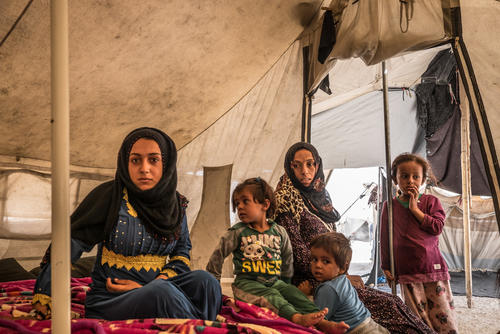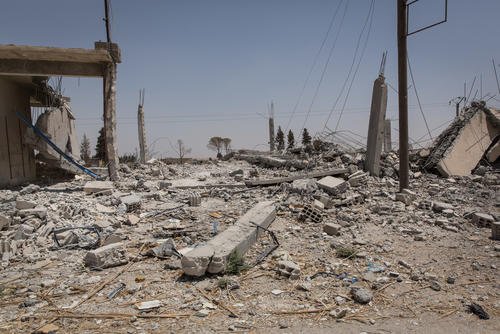The offensive on Raqqa, in northern Syria, which started in June 2017, ended on 17 October when the Syrian Democratic Forces (SDF), supported by the international coalition, took control of the city that had been cleared of fighters from the Islamic State (IS) group. But the end of the battle to control Raqqa doesn’t mean that the war in this part of Syria is over, or that people are no longer suffering.
How did people flee from Raqqa?
People who have fled the city and surrounding villages in the past months had to make the difficult decision of whether to stay put under heavy bombardment, or leave the city by crossing active frontlines and minefields.
Escaping the former IS stronghold was fraught with difficulties. People were punished if they were caught trying to flee, and generally only managed to leave by paying huge bribes. Some 1,300 people displaced by the conflict have recently arrived at Ain Issa camp.
What’s the humanitarian situation now in Raqqa and for people who fled the city?
The battle for Raqqa ended on 17 October and, to our knowledge, people left the city under frightening circumstances as the offensive drew closer. According to coalition forces, around 3,000 civilians were rescued during the last week of fighting, after an evacuation deal was agreed with the IS group. It would appear that people have been directed to Ain Issa camp, which already hosts nearly 12,000 internally displaced people from Raqqa and Deir ez-Zor. They undergo undergo further security screening but it’s unclear what this process entails or for how long people may be detained before being able to go home or to other safer areas.
From 10 to 18 October, 1,274 people were brought by Syrian democratic forces (SDF) from Raqqa city to Ain Issa camp. Nearly all of them are in a ‘special security area’, 200 metres away from the camp. It’s not clear why people newly arrived from Raqqa are segregated.
Most of the people who fled Raqqa during the last week are women and children. The men are elderly or have had limbs amputated and wear post-surgical external fixators. Some have gunshot wounds.
How is MSF supporting people who have just fled Raqqa?
Internally displaced people from Raqqa in regular areas of the camp have access to the outpatient department run by MSF. A medical consultation post was set up in the special security area. Overall, MSF has provided 77 medical consultations, mainly to women and children, and referred 13 patients to Kobanê hospital for treatment of old infected wounds.
Another team is giving catch-up vaccinations to children and working to mitigate outbreaks of diseases such as measles and polio.
People arriving from Raqqa and Deir ez-Zor are scared and uncertain of their future. They need clothes, food, water, shelter, healthcare and protection.
What injuries is MSF seeing?
As the frontlines shifted during the battle for Raqqa, especially as they drew closer to the most populated neighbourhoods, MSF teams in Tal Abyad hospital started to see more patients with weapon-related injuries.
On some days, up to 20 patients arrived at the hospital. Most had blast wounds from bombs or landmines, or trauma injuries resulting from buildings collapsing because of airstrikes. In the last days of the battle, the numbers of patients with these injuries decreased.
In Kobanê hospital, we received very few patients who were wounded in the fighting. In July, 63 people were treated for injuries caused mainly by gunshots or landmine and bomb blasts. In August, we received three patients.

Where is MSF working in Raqqa governorate?
At Tal Abyad hospital, MSF is supporting trauma care, surgical services and the overall running of the hospital in partnership with the local health authorities. For people around Raqqa who are injured or in need of emergency medical care, eight ambulances provide referral services to secondary healthcare facilities that MSF supports in Kobanê, Menbij, or Tal Abyad. MSF also works in advanced medical points in Hazima and Tabqa, north of Raqqa city. In addition, five vaccination teams are working across Raqqa governorate, including in Ain Issa camp.
In Ain Issa camp, we are running an outpatient department, providing nutrition support for infants and children under five years of age, mental health consultations, and physiotherapy, and organising health promotion activities. We are also running a primary healthcare clinic in the city of Tabqa and a team at Kobanê hospital is supporting the emergency room, intensive unit care, operating theatre, recovery room, and all surgical cases.
Is MSF inside Raqqa city?
No, we are not. We are on the outskirts of the city as it’s still extremely dangerous for humanitarian organisations and people from Raqqa to go there because of landmines and other war explosives. There is a large amount of destruction in the city, and the area needs to be fully demined before we are able to provide any assistance there.
What is needed from humanitarian organisations?
Humanitarian organisations need to be present to support people who have been affected by the conflict and provide impartial, neutral and meaningful assistance. An organised approach between all humanitarian actors to assess the needs in the camp, including water and sanitation, healthcare and food, needs to be carried out. As winter approaches in Syria, people who fled Raqqa will be planning to go back home. They will return to demolished towns and no means of living and will also need shelter, water, food and heating resources.



